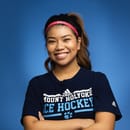What is the best part about your major?
My favorite thing about my major is getting to learn about extremely different parts of the world. At times it can be a challenge because I feel like I don’t know enough about any of them. I feel like I don’t know enough about Chinese, I don’t know enough about Arabic, I don’t know enough about German, but it gives me a broader perspective that I can bring into my linguistics classes. It also makes my linguistics classes easier, even though you do not need a second, third, or fourth language in order to take linguistics.
What languages are you proficient in or have studied?
My main languages are French, German, Arabic, and Chinese.
What made you want to design your own major?
When I first got here I was thinking of either International Relations or Engineering, or literally anything. That gave me the opportunity to take classes in a lot of different things my first year, which really helped me draw the conclusion that IR was not exactly what I wanted to do. I really wanted to specialize in languages because I felt like I was up to the challenge. It was funny because every language I learned, there was always someone telling me, “Oh, this language is harder.” So I learned German but people were like, “But there’s Russian and Arabic that’s so much harder.” So I started Arabic, and I literally had someone tell me, “But Chinese is harder.” It was infuriating but it also helped me to challenge myself more because I really wanted to say, “No, I know that one too and I can really tell you about which one is harder than the other.”
Do you have a favorite professor or professors (other than your parents)?
My favorite professor is Heba Arafah, who is on leave right now getting her doctorate in London. She definitely has helped me through my time here, especially my first two-and-a-half years. Unfortunately, I went abroad and she went to England to pursue her career, but she was really great because she just has a way of remaining exceedingly calm. It doesn’t matter how reckless or ridiculous our class was, she always brought our craziness to a close and kept going on with our class. She really cares to this day about me and really makes sure that I feel supported, and it’s really nice. She’s also a fantastic and amazing person. She is my favorite here. As far as within the Five Colleges, I really like Daniel Altshuler at Hampshire College. He’s been really interesting to take classes from.
What’s it like having parents who are professors?
The weirdest part is that people write reviews of them online. It’s funny to me to look at them because I know what they’re going to say, and they say it, and they think they have really told it to my parents. Especially with my dad, people are like, “He needs to assign easier homework,” but in the end he’s not going to assign easier homework. But having parents as professors has made the transition into college a lot easier because a college campus is not a brand new place for me because my mom worked at a state university and my dad worked at a private university. I am so used to the concept of a campus and also all these different facets of academia that were just dinner table discussions. That’s been a really big advantage especially because people can be really uncomfortable with different aspects and they’re not sure where they stand with professors and what to ask for, what not to ask for, and so I came in with that comfort level, and I could always call my parents when I had questions.
What is the best job you’ve ever had or work experience that you’re proudest of?
There have been work experiences that have been necessary, but not necessarily good. Managing 16- to 17-year-olds was interesting for the summer. You forget what high school drama is like when you experience it as a manager trying to get 16- and 17-year-olds to do their job. I don’t care how late you stayed up last night, I don’t care how many parties you went to, just do your job, that’s all that matters. But the best job was when I got to coordinate the after-school program between Mount Holyoke Athletics and Peck Elementary and Middle School. We worked with elementary school kids and I brought a different team every week. It was interesting to be coordinating all these varsity team schedules with what kids need. Ideally for kids it would be every single day because that consistency helps a lot, but that’s not going to work for varsity athletes, and that’s not going to work for me who also has practice. I was able to work it out and it was fun, the kids learned, and I learned a lot working with them. It was a really good experience for me to work on my skills in terms of self-discipline because when you work with communities, mainly CBL (community-based learning), it’s really on you to get stuff done. There’s nobody breathing down your neck for this assignment and that assignment. You don’t have specific hours except for the ones when you’re visiting your kids.
What are you most passionate about?
I find it very important that people really engage in politics to the extent that they really know what’s going on. I think that it’s very important that we confront that and one of the things that I found, that is abrasive to some people but not to me, is to argue about politics. I think it’s really important to have those conversations and learn from each other. Whereas for some people, it can sort of drag them down, for me that’s one of the ways I learn because that’s how my family is too. We always talk and discuss and argue about this, that, and the other thing because everybody comes from a different perspective, has read different articles, and studied different things. I know politics, especially education in politics, is something that I can’t shut up about.
Do you think after you graduate you will want to settle in one place, or travel?
Travel as in taking a gap year, no. I’ve always been very concerned about personal finance and having a safety net, and so I know I’m going to start working as soon as I can after graduation. I’m saving, but that isn’t to say that I’m going to stay in one place. I think it’s important to establish a base, and from there I’m definitely going to travel a lot. That’s why I studied so many languages. I get to absorb all these cultures, and I can’t do that from sitting at home. I know I want to travel but I don’t want to “do traveling.”
How did your study abroad experience change you as a person or did it impact your perspective on anything?
I went to Jordan in Spring 2016 and I went to China for two months in the summer with Mount Holyoke. Going to Jordan was an extremely worthwhile experience. It definitely did help me evolve honestly. For so long I’ve fought for empathy for others, whether you’ve met them or not. But it’s a whole new level of empathy when you actually meet the people you think you’re fighting for. None of these people ask me to fight for them or anything like that, but I think using my privilege and the fact that I come from Oklahoma to really enlighten others especially my fellow Oklahomans. Visiting Jordan gave me more hope because I became so much more comfortable with what’s going on in the Middle East. It’s extremely complicated, and I feel more comfortable now actually saying “It’s extremely complicated” whereas before I was very ignorant of what was truly going on. Having that experience really opened my eyes to what it was that I was missing. Whether or not I was reading every single article I could that was written by someone in Jordan, Lebanon, Syria, I wasn’t gaining first-hand experience and first-hand feelings of what’s going on and who’s who and what means what. That’s one of the biggest things we miss when we are learning about other cultures. We impose how we feel upon somebody else. We impose our norms, our upbringing, and our culture on somebody else’s culture, and we miss a lot. That’s one of the things that living in a place for an extended period of time can help change your view. When you spend five hours reading a book it’s very different from when you spend five months being part of the community. That was really important to me besides how much Arabic I learned—which was a lot, believe me. We also got to cook all sorts of food that was traditional to Jordan, Syria, and Palestine because we had teachers from all three countries. We ate amazing food together, and they would be very open and honest with us, which was amazing. They were unabashed guides for us, to lead us out of our little ignorant black hole. It was beautiful honestly. At the end of it I sort of thought about what was going on at the beginning of our semester, where all of us came and were really well intentioned and were like, “Oh, we got this. We’re going to be such social justice warriors.” And they slowly guided us through this process of really growing and really growing into better people, better advocates, better Arabic speakers. Honestly, part of that for me might have come from the fact that I was really close with the academic director who I think is amazing. I had all these different long talks with her where she was describing her home in Syria and I was describing where I was from in Oklahoma, and it felt like we were talking about the same type of people. It was so spot-on, it was so funny. I went away from that conversation thinking, “I wish every Oklahoman could have this conversation with somebody from a predominantly Muslim country.” I already was trying really hard to connect and trying to be better but then having this conversation it felt like something changed. There’s a really big difference between the words that you say, and the way that you feel. People do that all the time. You can say, “Donald Trump is president now, and that’s the way things are,” but inside you are screaming your head off. So that conversation really helped me shift gears.
Why did you decide to go to a women’s college?
My great-grandmother and all of her sisters went here. Then my cousin went here. My grandmother sent this commencement book from 1917 to my house, and I’m so excited to see it because I’m graduating in May 2017, and this is the commencement book from 100 years ago. I was choosing between Knox College and Mount Holyoke and my cousin heard I was graduating and applying to colleges. I came to the Northeast with my dad to visit colleges and she met us here. I swear she planned this because she was walking around campus with me saying hey and catching up with all these random people. She came back to campus a year, year and a half after graduation, and she’s totally comfortable. That was a beautiful thing to me. Besides the fact that this looks like the quintessential New England-y place to me, that was really something that helped me like it here more than Knox College, even though that was a hard decision.
What is one thing you will miss most about Mount Holyoke?
I will miss the supportive environment. One of the things a friend said during my first year was just “You do you, boo.” That is such an encapsulation of the whole attitude of Mount Holyoke. You do you, just don’t interfere with other people’s business. It’s just so great to have this environment where people all earnestly very loving. There’s always going to be drama, that’s a fact of life, you’re never going to please each other 100 percent. But you have this environment that tries to be healing and good and kind and it’s so wonderful to be in such a social environment where being mean is not cool. I’m going to really miss that. It’s not just because people are super liberal here and things like that, it’s that people are constantly working to better themselves and better their environment, and that I think is beautiful.
If you would like to write for Her Campus Mount Holyoke, or if you have any questions or comments for us, please email mt-holyoke@hercampus.com.



